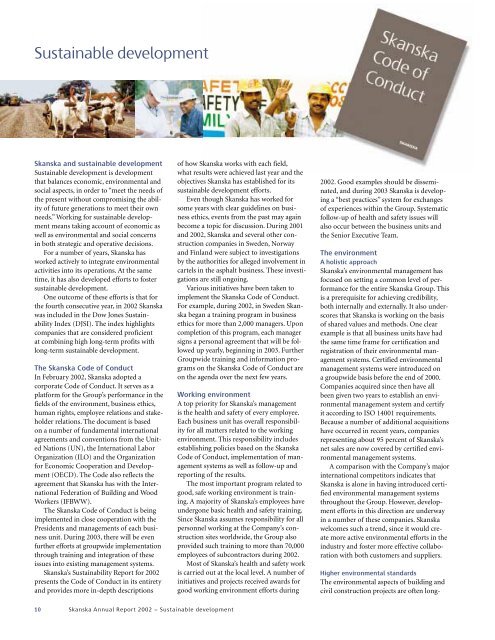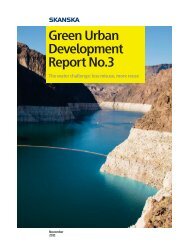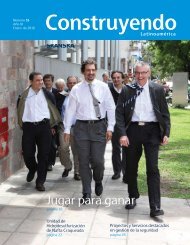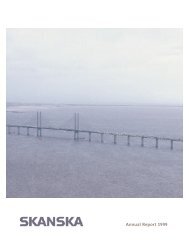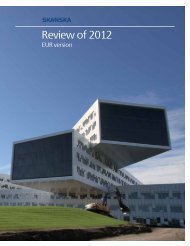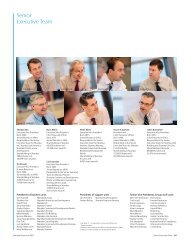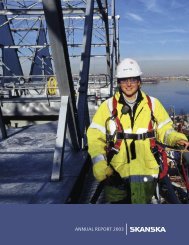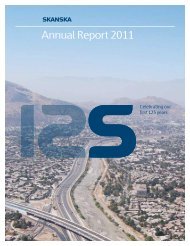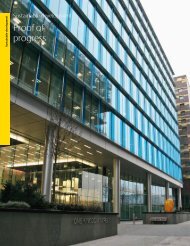ANNUAL REPORT 2002 - Skanska
ANNUAL REPORT 2002 - Skanska
ANNUAL REPORT 2002 - Skanska
Create successful ePaper yourself
Turn your PDF publications into a flip-book with our unique Google optimized e-Paper software.
Sustainable development<br />
<strong>Skanska</strong> and sustainable development<br />
Sustainable development is development<br />
that balances economic, environmental and<br />
social aspects, in order to “meet the needs of<br />
the present without compromising the ability<br />
of future generations to meet their own<br />
needs.” Working for sustainable development<br />
means taking account of economic as<br />
well as environmental and social concerns<br />
in both strategic and operative decisions.<br />
For a number of years, <strong>Skanska</strong> has<br />
worked actively to integrate environmental<br />
activities into its operations. At the same<br />
time, it has also developed efforts to foster<br />
sustainable development.<br />
One outcome of these efforts is that for<br />
the fourth consecutive year, in <strong>2002</strong> <strong>Skanska</strong><br />
was included in the Dow Jones Sustainability<br />
Index (DJSI). The index highlights<br />
companies that are considered proficient<br />
at combining high long-term profits with<br />
long-term sustainable development.<br />
The <strong>Skanska</strong> Code of Conduct<br />
In February <strong>2002</strong>, <strong>Skanska</strong> adopted a<br />
corporate Code of Conduct. It serves as a<br />
platform for the Group’s performance in the<br />
fields of the environment, business ethics,<br />
human rights, employee relations and stakeholder<br />
relations. The document is based<br />
on a number of fundamental international<br />
agreements and conventions from the United<br />
Nations (UN), the International Labor<br />
Organization (ILO) and the Organization<br />
for Economic Cooperation and Development<br />
(OECD). The Code also reflects the<br />
agreement that <strong>Skanska</strong> has with the International<br />
Federation of Building and Wood<br />
Workers (IFBWW).<br />
The <strong>Skanska</strong> Code of Conduct is being<br />
implemented in close cooperation with the<br />
Presidents and managements of each business<br />
unit. During 2003, there will be even<br />
further efforts at groupwide implementation<br />
through training and integration of these<br />
issues into existing management systems.<br />
<strong>Skanska</strong>’s Sustainability Report for <strong>2002</strong><br />
presents the Code of Conduct in its entirety<br />
and provides more in-depth descriptions<br />
of how <strong>Skanska</strong> works with each field,<br />
what results were achieved last year and the<br />
objectives <strong>Skanska</strong> has established for its<br />
sustainable development efforts.<br />
Even though <strong>Skanska</strong> has worked for<br />
some years with clear guidelines on business<br />
ethics, events from the past may again<br />
become a topic for discussion. During 2001<br />
and <strong>2002</strong>, <strong>Skanska</strong> and several other construction<br />
companies in Sweden, Norway<br />
and Finland were subject to investigations<br />
by the authorities for alleged involvement in<br />
cartels in the asphalt business. These investigations<br />
are still ongoing.<br />
Various initiatives have been taken to<br />
implement the <strong>Skanska</strong> Code of Conduct.<br />
For example, during <strong>2002</strong>, in Sweden <strong>Skanska</strong><br />
began a training program in business<br />
ethics for more than 2,000 managers. Upon<br />
completion of this program, each manager<br />
signs a personal agreement that will be followed<br />
up yearly, beginning in 2003. Further<br />
Groupwide training and information programs<br />
on the <strong>Skanska</strong> Code of Conduct are<br />
on the agenda over the next few years.<br />
Working environment<br />
A top priority for <strong>Skanska</strong>’s management<br />
is the health and safety of every employee.<br />
Each business unit has overall responsibility<br />
for all matters related to the working<br />
environment. This responsibility includes<br />
establishing policies based on the <strong>Skanska</strong><br />
Code of Conduct, implementation of management<br />
systems as well as follow-up and<br />
reporting of the results.<br />
The most important program related to<br />
good, safe working environment is training.<br />
A majority of <strong>Skanska</strong>’s employees have<br />
undergone basic health and safety training.<br />
Since <strong>Skanska</strong> assumes responsibility for all<br />
personnel working at the Company’s construction<br />
sites worldwide, the Group also<br />
provided such training to more than 70,000<br />
employees of subcontractors during <strong>2002</strong>.<br />
Most of <strong>Skanska</strong>’s health and safety work<br />
is carried out at the local level. A number of<br />
initiatives and projects received awards for<br />
good working environment efforts during<br />
<strong>2002</strong>. Good examples should be disseminated,<br />
and during 2003 <strong>Skanska</strong> is developing<br />
a “best practices” system for exchanges<br />
of experiences within the Group. Systematic<br />
follow-up of health and safety issues will<br />
also occur between the business units and<br />
the Senior Executive Team.<br />
The environment<br />
A holistic approach<br />
<strong>Skanska</strong>’s environmental management has<br />
focused on setting a common level of performance<br />
for the entire <strong>Skanska</strong> Group. This<br />
is a prerequisite for achieving credibility,<br />
both internally and externally. It also underscores<br />
that <strong>Skanska</strong> is working on the basis<br />
of shared values and methods. One clear<br />
example is that all business units have had<br />
the same time frame for certification and<br />
registration of their environmental management<br />
systems. Certified environmental<br />
management systems were introduced on<br />
a groupwide basis before the end of 2000.<br />
Companies acquired since then have all<br />
been given two years to establish an environmental<br />
management system and certify<br />
it according to ISO 14001 requirements.<br />
Because a number of additional acquisitions<br />
have occurred in recent years, companies<br />
representing about 95 percent of <strong>Skanska</strong>’s<br />
net sales are now covered by certified environmental<br />
management systems.<br />
A comparison with the Company’s major<br />
international competitors indicates that<br />
<strong>Skanska</strong> is alone in having introduced certified<br />
environmental management systems<br />
throughout the Group. However, development<br />
efforts in this direction are underway<br />
in a number of these companies. <strong>Skanska</strong><br />
welcomes such a trend, since it would create<br />
more active environmental efforts in the<br />
industry and foster more effective collaboration<br />
with both customers and suppliers.<br />
Higher environmental standards<br />
The environmental aspects of building and<br />
civil construction projects are often long-<br />
10 <strong>Skanska</strong> Annual Report <strong>2002</strong> — Sustainable development


